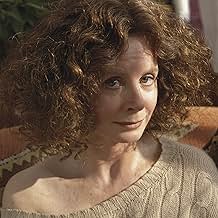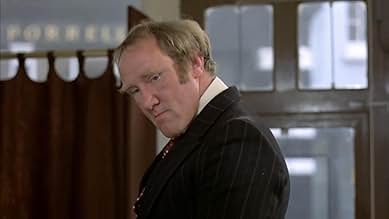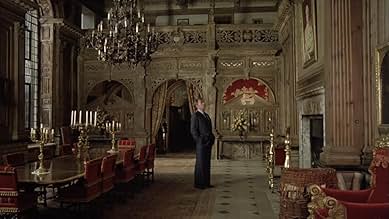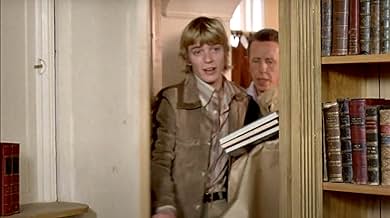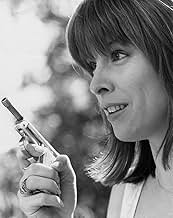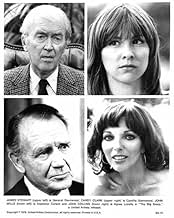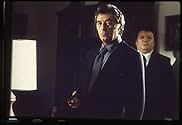Ajouter une intrigue dans votre langueA grizzled American private detective in England investigates a complicated case of blackmail-turned-murder involving a rich but honest elderly general, his two loose socialite daughters, a ... Tout lireA grizzled American private detective in England investigates a complicated case of blackmail-turned-murder involving a rich but honest elderly general, his two loose socialite daughters, a pornographer, and a gangster.A grizzled American private detective in England investigates a complicated case of blackmail-turned-murder involving a rich but honest elderly general, his two loose socialite daughters, a pornographer, and a gangster.
- Réalisation
- Scénario
- Casting principal
- Karl Lundgren
- (as Simon Turner)
Avis à la une
For one reason or another, Michael Winner has decided to move things over to England; although the lead man remains American. This change in location has not really had an effect on the story; but it did leave Winner free to recruit an excellent roster of British stars. Among the names in the cast list are Oliver Reed, John Mills, Joan Collins, Richard Boone and Edward Fox. The film is lead by Robert Mitchum, who while not as great as Humphrey Bogart, still makes an excellent leading man and there's also enough room in the cast for an aging James Stewart. The film is a lot shorter than the earlier version of this story and Winner has really trimmed things down a lot, which means that the story is much more straight forward than it was in the 1946 film. This is not really a bad thing as it does mean that the film is easier to follow; although it also seems less expansive. The characters take something of a backseat too, with only the lead character getting any real development. Still, this is at least an entertaining thriller and I don't feel like I wasted my time watching it; although Howard Hawks' version is better.
The plot broadly follows that of the 1946 film, with the striking exception that the action takes place in London rather than Los Angeles. This does not, however, mean that the original has been completely anglicised. Both Philip Marlowe and General Sternwood are American expatriates living in London rather than Englishmen, and they are played by two of Hollywood's biggest stars, Robert Mitchum and James Stewart. With the exception of Richard Boone as Canino and Candy Clark as Sternwood's younger daughter, the other main parts are all played by British actors.
The film was clearly made as homage to the famous Humphrey Bogart classic, and it is inevitable that comparisons will be made between the two. In some respects, in fact, the later film is superior to, or at least as good as, the earlier one. (I have not read Raymond Chandler's novel, so I cannot say which film is closer to the original source material). The 1946 film is a fine one, but it is not perfect and has a number of weaknesses, not least its insanely complicated plot containing threads that are never developed and events that are never explained. The plot of the 1978 film, while complex enough, is somewhat easier to follow than that of its predecessor. To the purist Bogart fan there can be no substitute for the original, but to anyone else Robert Mitchum, himself a fine exponent of the film noir style during the early part of his career in the forties and fifties, seems like the best possible replacement. He is, of course, older than Bogart was when he played the role, and his portrayal of the character is perhaps less cynical and more thoughtful, but it is a perfectly acceptable interpretation. There are also good performances from Stewart in the cameo role of Sternwood, from Oliver Reed and from Joan Collins.
As a whole, however, the film does not live up to the standard of the original. Certainly, not all the actors are as good as their 1946 counterparts (Sarah Miles, for example, is no Lauren Bacall), but the main reason for its comparative failure goes deeper. The Bogart movie is perhaps the quintessential film noir, a film that one watches less for its plot, or even for its acting, than for its unique atmosphere of cynicism, menace and dubious glamour. An important factor in creating that atmosphere is its dark, brooding black-and-white photography. Unfortunately, in the late seventies the use of black-and-white was generally regarded as the equivalent of hanging a sign on the cinema door saying 'Warning! Art-house Movie! Intellectuals Only!' A few established auteur directors such as Woody Allen ('Manhattan') and Martin Scorsese ('Raging Bull') could get away with using monochrome, but there was no way that the studio would allow such latitude to Michael Winner, a director generally associated with violent commercial thrillers. So colour it had to be. In fact, the photography of London and the English countryside is quite attractive, but it is no substitute for the authentic film noir look.
I mentioned that the atmosphere of the earlier film was also one of dubious glamour; besides Bacall it has a large number of other strikingly beautiful but sinister women (some of them only in minor roles). The later film cannot compete in this respect. With the exception of Joan Collins (who could do sultry but sinister glamour in spades, even in her mid-forties), none of the female characters has the required touch of the femme fatale about her.
As a London-based crime thriller, Winner's 'The Big Sleep' is not a bad film; it is better than most of its director's other thrillers and better than a lot of other British films from the seventies. As homage to its namesake, however, it falls some way short of its aims. 6/10
It came as a surprise to me that Michael Winner was the director for the film. A man I associate with expensive dinners at expensive restaurants. But after watching this, and Death Wish, I have a new-found respect for eating in style. This film is not a Peckinpah, but it still manages to be incredibly effective in it's delivery. I like the car Mitchum drives too, a Mercedes soft-top.
The video is in widescreen by the way, requiring a screen re-adjustment or it'll look silly. Great performances from all of the actors and a superbly enjoyable plot in a film that has aged very well.
Some people criticised this film for being in the English countryside and that it doesn't bear up with the film noir style. I disagree, film noir is not limited to shady city streets, as this film goes to show.
First of all, the plot stays true to the novel, whereas the older version had a plot ruined by the restrictions of the Hayes code, so that it contains numerous loose ends and unexplained developments.
Secondly, Robert Mitchum impersonates Marlowe much better that Humphrey Bogart. Bogart essentially recycles his role of Sam Spade in "The Maltese Falcon". Yet, Spade and Marlowe are very different characters. While Spade is a cynic who just barely remembers the remnants of morality (and Bogart is brilliant in that role), Marlowe is way beyond that point. He walks around people in a distanced, almost detached way. Only when he spots a glimpse of humanity in his fellow men, he is willing to engage himself (as with General Sternwood in "The Big Sleep"). Mitchum plays this character with great understatement, as it should be done, while Bogart makes Marlowe just another hard-boiled detective, which could be replaced by any other one.
Finally, both Sarah Miles and Candy Clark (while not being necessarily great actresses) bring over the lunacy of the Sternwood daughters beautifully. While the scenes between Bacall and Bogart a great, they are out of place in this plot, in which there is no place left for romance. It might have been appropriate for the characters of Marlowe and Linda Loring in "The Long Goodbye", but hardly in a movie adaption of a novel, in which Marlowe remarks "both Sternwood women were giving him hell".
So, while this movie transfers the plot to another time and another place, it is a much better adaption of the novel than the version often regarded as a classic.
But Richard Amsel's poster is great!
Le saviez-vous
- AnecdotesJames Stewart had difficulty saying his lines on time due to hearing and possibly memory problems. Some of the cast were shocked by his aged appearance. Robert Mitchum recalled, "The picture was all about corpses, but Jimmy looked deader than any of them." Stewart actually outlived Mitchum by one day, nearly 20 years later.
- GaffesWhen Marlowe takes the gun from Camilla after she unloads it on him with multiple blank rounds, he grabs the barrel with his bare hands. That should have proved to be very painful as the barrel would be extremely hot.
EDIT: This is incorrect. Blank cartridges in a small calibre gun will not heat the barrel to any great extent. A gun barrel gets hot mainly due to the friction of the bullet going through the barrel, not from the powder in the cartridge.
- Citations
Charlotte Sternwood: [when Marlowe declines to blackmail her] Wha-? You don't want money?
Philip Marlowe: Oh sure. All I itch for is money. I'm so greedy that for fifty pounds a day plus expenses on the day I work, I risk my future, the hatred of the cops, of Eddie Mars and his pals, I dodge bullets and put up with slaps and say "Thank you very much. If you have any further trouble please call me: I'll just put my card here on the table." I do all that for a few pounds. And maybe just a little bit to protect what little pride a sick and broken old man has in his family, so that he can believe his blood is not poisoned. That his little girls - though they may be a trifle wild - are not perverts and killers.
- ConnexionsFeatured in James Stewart, Robert Mitchum: Les deux visages de l'Amérique (2017)
Meilleurs choix
Détails
- Date de sortie
- Pays d’origine
- Langue
- Aussi connu sous le nom de
- The Big Sleep
- Lieux de tournage
- Knebworth House, Knebworth, Hertfordshire, Angleterre, Royaume-Uni(Sternwood Mansion)
- Sociétés de production
- Voir plus de crédits d'entreprise sur IMDbPro
Box-office
- Budget
- 3 000 000 £GB (estimé)


